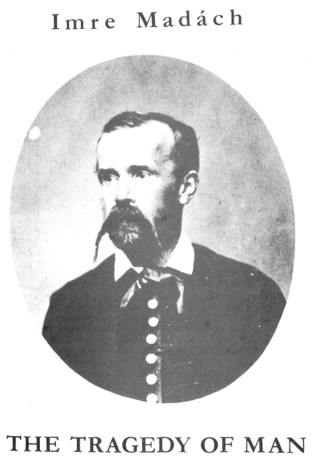

|
Published by the Hungarian Centre of the International Theatre Institute Responsible editor: György Lengyel, President of the Hungarian Centre of the ITI Selected and edited by Erzsébet Bereczky ISBN 963 691 054 5 Printed by Hungarian Theatre Institute in 1985 POB 23, Budapest, H-1253 |
| Foreword György Lengyel |
7 |
| A
Dramatic Poem from Hungary to the Theatres of the World dr. Ferenc Kerényi |
9 |
| The New Tragedy of
Man Sándor Hevesi |
34 |
| A Generation under
the Spell of The Tragedy of Man dr. Antal Németh |
37 |
| “I hear, I hear the
coming epoch’s song” Endre Gellért |
41 |
| An Up-to-Date Tragedy
of Man Tamás Major |
50 |
|
Open‑air Performances of The Tragedy of Man |
57 |
|
Two Tragedy Productions |
61 |
|
Notes on Putting on the Tragedy |
67 |
| Translations of The Tragedy of Man | 72 |
| Performances of The Tragedy of Man Abroad | 77 |
| Broadcasts of The Tragedy of Man Abroad | 78 |
|
Guest-performances of The Tragedy of Man of the |
78 |
| The Authors of the Book | 79 |
|
Imre Madách: The Tragedy of Man |
127 |
5
FOREWORD
If we, Hungarians were asked to choose the literary work that we consider to be the closest to us, the most expressive of our history, the most modern classic which talks about our past and present with the same power and which, I believe, will also have a message for the future; well, this work would be The Tragedy of Man. The strange thing about it is that the play does not take place in Hungary. It is a powerful vision of the poetplaywright about mankind, beginning with the creation up to an imaginary future through episodes of the history of the world in the form of the main characters’ dreams. If asked, I would not hesitate to say that no other play reveals so much about us to the world. For theatres and audiences throughout the world, the most easily approachable and receptible Hungarian drama would be The Tragedy of Man. Up to now, it has been translated into 29 languages; there have been 9 different translations into English only. It has been put on the stage several times in different countries but I think the real breakthrough is going to come now. This present volume is being published to commemorate the one hundredth anniversary of the first performance of the play and also to make it more widely and better known all over the world. The book contains the thoughts and notes of the directors of the most interesting performances in the past one hundred years as well as an essay on the history of The Tragedy of Man on the stage written by eminent Madách-scholar Dr. Ferenc Kerényi. There are a lot of photographs and also a bibliography to make the book complete. The Tragedy is about the basic questions of our life today: it presents a whole series of dramatic problems. It is a dream, a vision 7 about Hungarian history, about mankind, politics, love, about the controversial relationship between man and God, individual and the masses. We have to be aware that the Tragedy was written in one of the most tragic periods of Hungarian history. And in spite of all the inner doubts and contradictions expressed in it, it is the drama of everlasting fight and of survival. György Lengyel 8 |
SOURCE: The Tragedy of Man: Essays About the Ideas and the Directing of the Drama: Full Text of the Drama / Imre Madách, translated by Joseph Grosz, responsible editor: György Lengyel, selected and edited by Erzsébet Bereczky.
The Tragedy of Man by Imre Madách,
translated by George Szirtes
Scene 13
Imre Madách’s “The Tragedy of Man” by István Sőtér
Die ungarische Dramenliteratur by Georg Lukács
The Metaphysics of Tragedy: Excerpts by Georg Lukács
La
Tragedio de l’ Homo: Kovrilo
de Imre Madách, tradukis Kálmán Kalocsay, bildo de Mihály
Zichy (1924)
Al
horizonto de la historio de la homaro — pri “La Tragedio de L’
Homo”
de SHI Chengtai
Kompara analizo de tri tradukoj el La Tragedio de l’ Homo de Márton Fejes
Pessimism as Philosophy: A Jaundiced Selected Annotated Bibliography
Georg Lukács’ The Destruction of Reason: Selected Bibliography
From
Eden to Cain: Unorthodox Interpretations & Literary Transformations:
Selected Bibliography
De Edeno
al Kaino:
Malkutimaj Interpretoj & Literaturaj Pritraktoj en Esperanto:
Bibliografio
Science Fiction & Utopia Research Resources: A Selective Work in Progress
Sándor Szathmári (1897-1974): Bibliografio & Retgvidilo / Bibliography & Web Guide
Offsite:
Imre Madách - Wikipedia, the free encyclopedia
The Tragedy of Man - Wikipedia, the free encyclopedia
“Madách tragédiája”
[In Hungarian: Madách’s tragedy] (1955)
by György Lukács
The Tragedy of Man translated by George Szirtes
Home Page | Site
Map | What's New | Coming Attractions | Book
News
Bibliography | Mini-Bibliographies | Study
Guides | Special Sections
My Writings | Other Authors' Texts | Philosophical
Quotations
Blogs | Images
& Sounds | External Links
CONTACT Ralph Dumain
Uploaded 5 March 2015
Site ©1999-2016 Ralph Dumain